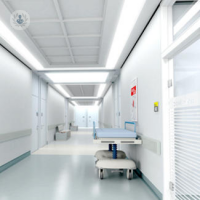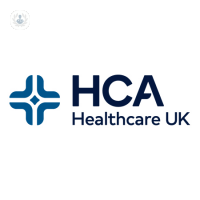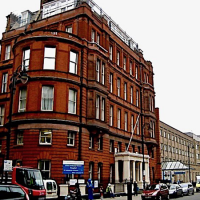What is hydronephrosis?
Hydronephrosis literally translates to ‘water on the kidney’. It is a condition in which one or both of the kidneys swell as a result of urine build up, when urine cannot properly drain out from the kidney to the bladder. It can affect anyone at any age, but it is sometimes found in unborn babies during pregnancy scans. In this case, it is referred to as antenatal hydronephrosis.
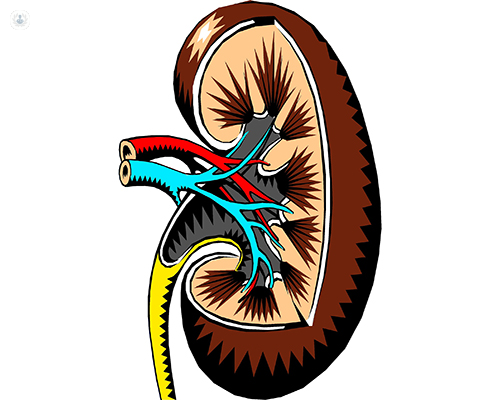
Prognosis
Hydronephrosis generally does not cause long-term problems, as long as it is properly diagnosed and treated. In some babies, it does not even need to be treated and goes away on its own. If the condition is left untreated, however, the kidneys may be scarred which can lead to renal failure.
Symptoms of hydronephrosis
Hydronephrosis does not always cause symptoms. The main symptom, if any do occur, is pain in either the side or the back (flank pain). Other symptoms may include pain while urinating, increased urge, urinating more frequently, or incontinence.
Medical tests to diagnose hydronephrosis
Hydronephrosis is commonly found on antenatal scans during routine ultrasounds in pregnancy. It is estimated that hydronephrosis affects 1 in every 100 babies, but in most of these cases, it will resolve on its own. If it is spotted during an ultrasound, you may need to have more frequent scans during pregnancy, and your baby may need to have scans after birth to keep track of progress.
In adults, hydronephrosis is also generally diagnosed during an ultrasound. Your doctor may order further tests such as a blood test, a urine test, a CT scan and an X-ray of your kidneys to help find out the cause of the hydronephrosis.
What are the causes of hydronephrosis?
Hydronephrosis occurs when there is a blockage or obstruction to the outflow of urine from the kidney. In adults, causes include:
- Pregnancy
- Kidney stones
- BPH (benign prostatic hyperplasia)
- Pelvic organ prolapse
- Cancers in and around the urinary tract
- The ureters narrowing
In babies, the cause is not often clear, although it is speculated that hydronephrosis may occur as a result of an increase in urine the baby develops in the later stages of pregnancy. Sometimes it can be caused by the ureters not functioning properly, or by a blockage in the urinary tract. These problems usually resolve by themselves in babies.
Can hydronephrosis be prevented?
Hydronephrosis is generally triggered by an underlying cause which cannot be prevented. Having regular check-ups can help for a swifter diagnosis.
Treatments for hydronephrosis
The treatment of hydronephrosis aims to drain the urine from the kidneys, and to treat the underlying cause. The urine is drained by inserting a catheter into either the bladder through the urethra, or the kidney through a cut in the skin. If the kidney has been severely damaged, removal may be necessary.
Once the urine has been drained, the underlying cause must be treated.
Which type of specialist treats hydronephrosis?
A urologist typically treats hydronephrosis, though in children, a paediatric urologist is generally involved in treatment.
02-20-2018 05-05-2023Hydronephrosis
Miss Marie-Klaire Farrugia - Paediatric urology
Created on: 02-20-2018
Updated on: 05-05-2023
Edited by: Conor Dunworth
What is hydronephrosis?
Hydronephrosis literally translates to ‘water on the kidney’. It is a condition in which one or both of the kidneys swell as a result of urine build up, when urine cannot properly drain out from the kidney to the bladder. It can affect anyone at any age, but it is sometimes found in unborn babies during pregnancy scans. In this case, it is referred to as antenatal hydronephrosis.

Prognosis
Hydronephrosis generally does not cause long-term problems, as long as it is properly diagnosed and treated. In some babies, it does not even need to be treated and goes away on its own. If the condition is left untreated, however, the kidneys may be scarred which can lead to renal failure.
Symptoms of hydronephrosis
Hydronephrosis does not always cause symptoms. The main symptom, if any do occur, is pain in either the side or the back (flank pain). Other symptoms may include pain while urinating, increased urge, urinating more frequently, or incontinence.
Medical tests to diagnose hydronephrosis
Hydronephrosis is commonly found on antenatal scans during routine ultrasounds in pregnancy. It is estimated that hydronephrosis affects 1 in every 100 babies, but in most of these cases, it will resolve on its own. If it is spotted during an ultrasound, you may need to have more frequent scans during pregnancy, and your baby may need to have scans after birth to keep track of progress.
In adults, hydronephrosis is also generally diagnosed during an ultrasound. Your doctor may order further tests such as a blood test, a urine test, a CT scan and an X-ray of your kidneys to help find out the cause of the hydronephrosis.
What are the causes of hydronephrosis?
Hydronephrosis occurs when there is a blockage or obstruction to the outflow of urine from the kidney. In adults, causes include:
- Pregnancy
- Kidney stones
- BPH (benign prostatic hyperplasia)
- Pelvic organ prolapse
- Cancers in and around the urinary tract
- The ureters narrowing
In babies, the cause is not often clear, although it is speculated that hydronephrosis may occur as a result of an increase in urine the baby develops in the later stages of pregnancy. Sometimes it can be caused by the ureters not functioning properly, or by a blockage in the urinary tract. These problems usually resolve by themselves in babies.
Can hydronephrosis be prevented?
Hydronephrosis is generally triggered by an underlying cause which cannot be prevented. Having regular check-ups can help for a swifter diagnosis.
Treatments for hydronephrosis
The treatment of hydronephrosis aims to drain the urine from the kidneys, and to treat the underlying cause. The urine is drained by inserting a catheter into either the bladder through the urethra, or the kidney through a cut in the skin. If the kidney has been severely damaged, removal may be necessary.
Once the urine has been drained, the underlying cause must be treated.
Which type of specialist treats hydronephrosis?
A urologist typically treats hydronephrosis, though in children, a paediatric urologist is generally involved in treatment.


Hydronephrosis in children: your comprehensive overview
By Diane De Caluwe
2024-12-14
Hydronephrosis is the swelling of one or both kidneys. The overall cause is a build-up of urine and this build-up is the result of one of several potential issues. Naturally, kidney problems in a child are worrying for any parent, but treatment, if necessary, is highly effective. Mrs Diane De Caluwe, a consultant paediatric urologist based in London, provides you with a general but detailed understanding of the diagnosis, causes and treatment of hydronephrosis is children. See more


Hydronephrosis - information for parents
By Dr Kishor Tewary
2024-12-13
Hydronephrosis means ‘excessive water/urine collection in the kidneys’. Hence, it’s a condition where urine cannot drain out of the kidneys properly, causing them to swell up or stretch. It can affect one or both kidneys. Dr Kishor Tewary, consultant paediatrician, with a special interest in uro-nephrology tells us more about hydronephrosis in children. See more
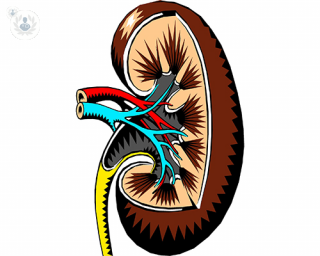

An overview of hydronephrosis
By Mr Nav Johal
2024-12-13
Hydronephrosis is a condition which involves swelling of the kidney due to a backup of urine, provoking frequent urination and causing discomfort. Mr Nav Johal, distinguished consultant paediatric urologist provides an overview of the condition, including diagnosis and treatment options. See more
Experts in Hydronephrosis
-
Miss Marie-Klaire Farrugia
Paediatric urologyExpert in:
- Paediatric urology
- Urinary incontinence
- Urinary tract infection
- Vesicoureteral reflux (VUR) (kidney reflux)
- Circumcision
- Hydronephrosis
-
Diane De Caluwe
Paediatric urologyExpert in:
- Hydronephrosis
- Paediatric urology
- Circumcision
- Urinary tract infection
- Diurnal enuresis (daytime wetting)
- Hernia
-
Dr Kishor Tewary
PaediatricsExpert in:
- Bedwetting
- Urinary tract infections in children
- Urinary incontinence
- Urination disorders
- Hydronephrosis
- Vesicoureteral reflux (VUR) (kidney reflux)
-
Mr Alexander Cho
Paediatric urologyExpert in:
- Paediatric urology
- Kidney stones
- Foreskin problems
- Bladder problems
- Undescended testicle (Cryptorchidism)
- Hydronephrosis
-
Mr Nav Johal
Paediatric urologyExpert in:
- Hydronephrosis
- Foreskin problems
- Undescended testicle (Cryptorchidism)
- Vesicoureteral reflux (VUR) (kidney reflux)
- Hypospadias
- Urinary tract infection
- See all

Spire Little Aston Hospital
Spire Little Aston Hospital
Little Aston Hall Drive, Sutton Coldfield, B74 3UP
No existe teléfono en el centro.
By using the telephone number provided by TOP DOCTORS, you automatically agree to let us use your phone number for statistical and commercial purposes. For further information, read our Privacy Policy
Top Doctors

The Portland Hospital - part of HCA Healthcare
The Portland Hospital - part of HCA Healthcare
205 - 209 Great Portland St. W1W 5AH
No existe teléfono en el centro.
By using the telephone number provided by TOP DOCTORS, you automatically agree to let us use your phone number for statistical and commercial purposes. For further information, read our Privacy Policy
Top Doctors

Great Ormond Street Hospital
Great Ormond Street Hospital
Great Ormond Street. WC1N 3JH
No existe teléfono en el centro.
By using the telephone number provided by TOP DOCTORS, you automatically agree to let us use your phone number for statistical and commercial purposes. For further information, read our Privacy Policy
Top Doctors
-
Spire Little Aston Hospital
Little Aston Hall Drive, Sutton Coldfield, B74 3UP, Sutton ColdfieldExpert in:
- Bariatric Surgery
- General Surgery
- Orthopaedic surgery
- Robotic Surgery
- Diagnostic Imaging
- Ophthalmology
-
The Portland Hospital - part of HCA Healthcare
205 - 209 Great Portland St. W1W 5AH, Central LondonExpert in:
- Neurological spinal surgery
- Orthopaedic spinal surgery
- Maternity care
- Pregnancy
- Scoliosis
- In vitro fertilisation (IVF)
-
Great Ormond Street Hospital
Great Ormond Street. WC1N 3JH, Central LondonExpert in:
- Cancer
- Paediatric neurosurgery
- Paediatrics
- Most viewed diseases, medical tests, and treatments
- Child nutrition
- Undescended testicle (Cryptorchidism)
- Migraine
- Paediatric rheumatology
- Autoimmune diseases
- Joint pain
- Nutrition
- Abdominal pain
- Heart murmur in children
- Kidney stones





